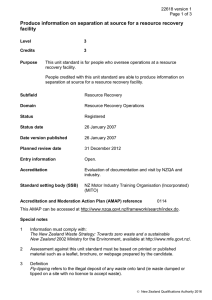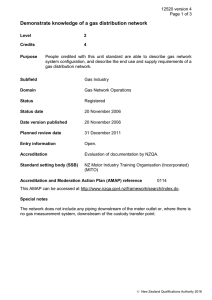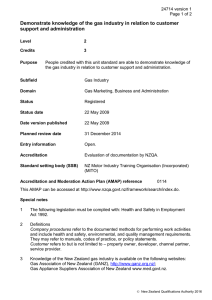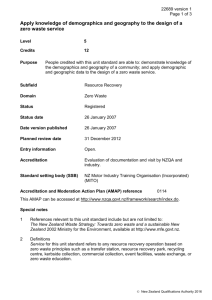Analyse a community or institution for the implementation of zero... principles
advertisement
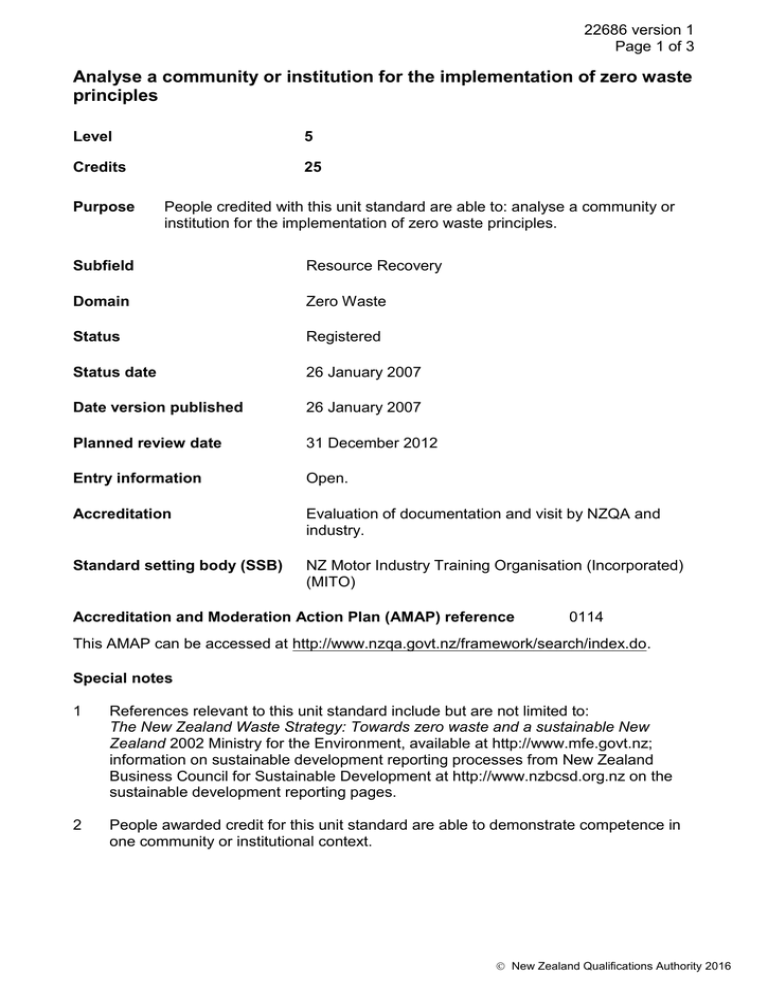
22686 version 1 Page 1 of 3 Analyse a community or institution for the implementation of zero waste principles Level 5 Credits 25 Purpose People credited with this unit standard are able to: analyse a community or institution for the implementation of zero waste principles. Subfield Resource Recovery Domain Zero Waste Status Registered Status date 26 January 2007 Date version published 26 January 2007 Planned review date 31 December 2012 Entry information Open. Accreditation Evaluation of documentation and visit by NZQA and industry. Standard setting body (SSB) NZ Motor Industry Training Organisation (Incorporated) (MITO) Accreditation and Moderation Action Plan (AMAP) reference 0114 This AMAP can be accessed at http://www.nzqa.govt.nz/framework/search/index.do. Special notes 1 References relevant to this unit standard include but are not limited to: The New Zealand Waste Strategy: Towards zero waste and a sustainable New Zealand 2002 Ministry for the Environment, available at http://www.mfe.govt.nz; information on sustainable development reporting processes from New Zealand Business Council for Sustainable Development at http://www.nzbcsd.org.nz on the sustainable development reporting pages. 2 People awarded credit for this unit standard are able to demonstrate competence in one community or institutional context. New Zealand Qualifications Authority 2016 22686 version 1 Page 2 of 3 3 Definitions Community refers to a group of interdependent people inhabiting the same region such as a suburb, ward, town, or rural locality. Industry publications refer to materials available in electronic or hard copy from organisations and programmes that promote zero waste principles including but not limited to: BusinessCare National Trust, available at http://www.businesscare.org.nz; Lifeafterwaste programme developed by the Waste Management Institute of New Zealand (WasteMINZ) available at http://wwww.wasteminz.org.nz; NZ Business Council for Sustainable Development, available at http://www.nzbcsd.org.nz; Recycling Operators of New Zealand (RONZ), available at http://www.ronz.org.nz/; Zero Waste New Zealand Trust, available at http://www.zerowaste.co.nz. Institution refers to a primary school, secondary school, tertiary provider, or hospital. Elements and performance criteria Element 1 Analyse a community or institution for the implementation of zero waste principles. Performance criteria 1.1 The analysis provides zero waste targets that meet the requirements of the community or institution. Range 1.2 The analysis conveys information relevant to, and consistent with, the community or institution. Range 1.3 includes but is not limited to – availability of resource recovery facilities, issues, benefits. Information is obtained from sources relevant to zero waste. Range 1.4 includes but is not limited to – designated target year, interim stages. a minimum of four sources such as – zero waste organisations, Ministry for the Environment, industry publications, local government publications, course notes, conference proceedings, Internet, journals. Specified opportunities for zero waste are supported with measured data, and indicators in accordance with industry publications. Range opportunities include but are not limited to – reduction, reuse, recycling; data may include but are not limited to – waste audit, survey, questionnaire, trial, costs. New Zealand Qualifications Authority 2016 22686 version 1 Page 3 of 3 1.5 Selection of material for analysis and pertinence of data demonstrates understanding of zero waste principles and enables informed decisions to be made by the community or institution. Range 1.6 Selection of people to inform the analysis covers the whole community or institution. Range 1.7 includes but is not limited to – organics, toxic substances, recyclable resources. may include but is not limited to – government agency, business personnel, employees, students. The analysis provides recommendations for incentives, operational processes, and penalties that support removing selected items from the waste stream. Range operational processes include but are not limited to – design, collection, sorting, disposal; items include but are not limited to – packaging, paper, plastics, food scraps, hazardous substances, green waste. Please note Providers must be accredited by the Qualifications Authority, or an inter-institutional body with delegated authority for quality assurance, before they can report credits from assessment against unit standards or deliver courses of study leading to that assessment. Industry Training Organisations must be accredited by the Qualifications Authority before they can register credits from assessment against unit standards. Accredited providers and Industry Training Organisations assessing against unit standards must engage with the moderation system that applies to those standards. Accreditation requirements and an outline of the moderation system that applies to this standard are outlined in the Accreditation and Moderation Action Plan (AMAP). The AMAP also includes useful information about special requirements for organisations wishing to develop education and training programmes, such as minimum qualifications for tutors and assessors, and special resource requirements. Comments on this unit standard Please contact the NZ Motor Industry Training Organisation (Incorporated) (MITO) info@mito.org.nz if you wish to suggest changes to the content of this unit standard. New Zealand Qualifications Authority 2016

